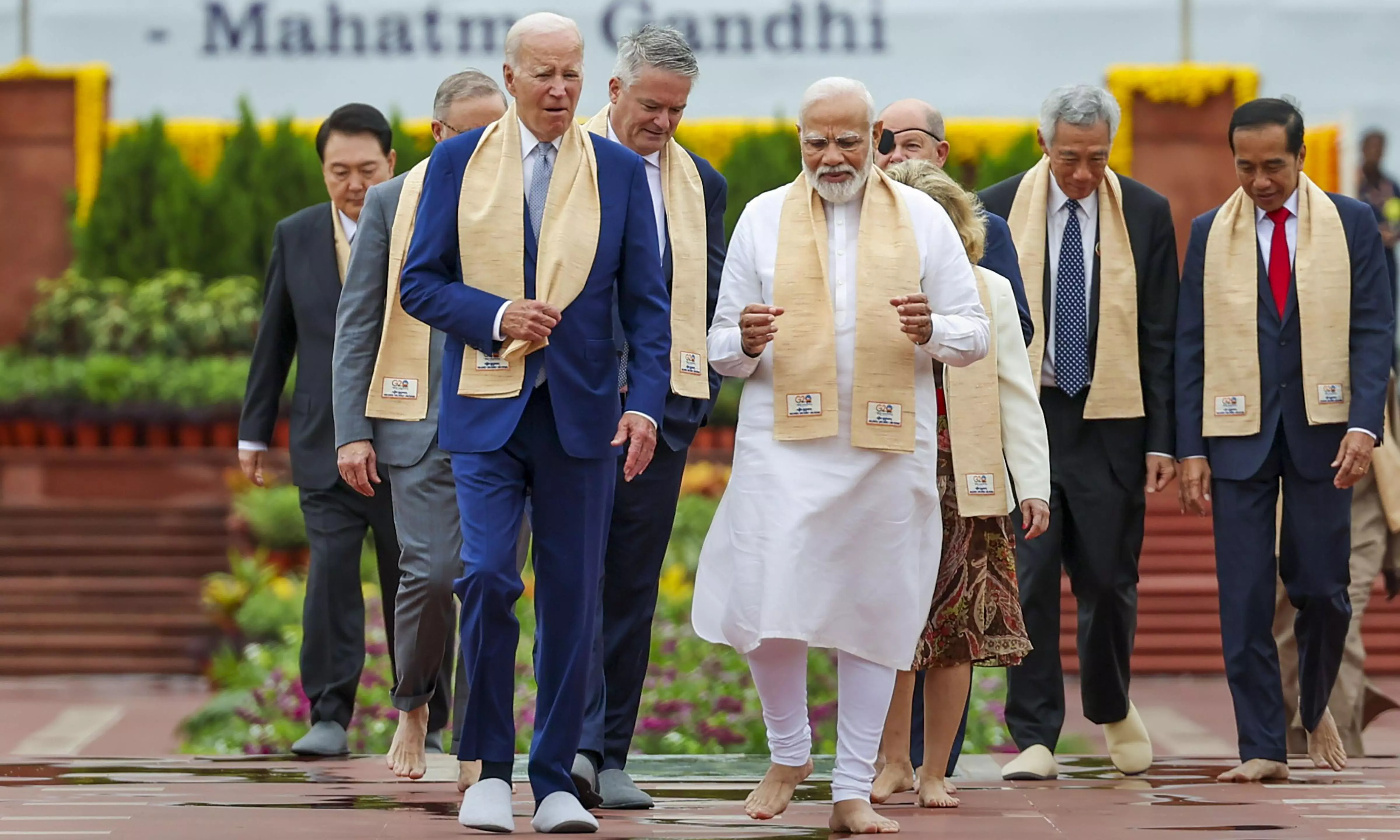
- Home
- India
- World
- Premium
- THE FEDERAL SPECIAL
- Analysis
- States
- Perspective
- Videos
- Sports
- Education
- Entertainment
- Elections
- Features
- Health
- Business
- Series
- In memoriam: Sheikh Mujibur Rahman
- Bishnoi's Men
- NEET TANGLE
- Economy Series
- Earth Day
- Kashmir’s Frozen Turbulence
- India@75
- The legend of Ramjanmabhoomi
- Liberalisation@30
- How to tame a dragon
- Celebrating biodiversity
- Farm Matters
- 50 days of solitude
- Bringing Migrants Home
- Budget 2020
- Jharkhand Votes
- The Federal Investigates
- The Federal Impact
- Vanishing Sand
- Gandhi @ 150
- Andhra Today
- Field report
- Operation Gulmarg
- Pandemic @1 Mn in India
- The Federal Year-End
- The Zero Year
- Science
- Brand studio
- Newsletter
- Elections 2024
- Events
- Home
- IndiaIndia
- World
- Analysis
- StatesStates
- PerspectivePerspective
- VideosVideos
- Sports
- Education
- Entertainment
- ElectionsElections
- Features
- Health
- BusinessBusiness
- Premium
- Loading...
Premium - Events

Akin to other multilateral groupings of past like NAM and SAARC, G20 is heading dangerously into oblivion
The two-day G20 summit in Delhi is over. The leaders’ declaration was agreed upon unanimously, and the group now moves towards Brazil for next year’s summit. Successful, one would say? Yes, if seen superficially. But the story does not end there.
There are troubling questions about the G20 itself. Take the summit declaration, for example. On the Ukraine war, it stated that the group noted, “with deep concern", "the immense human suffering and the adverse impact of wars and conflicts around the world”.
Further, each nation reiterated its national positions and resolutions adopted at the UN Security Council and the UN General Assembly besides a general advice that “In line with the UN Charter, all states must refrain from the threat or use of force to seek territorial acquisition against the territorial integrity and sovereignty or political independence of any state.”
The declaration further “highlighted the human suffering and negative added impacts of the war in Ukraine with regard to global food and energy security, supply chains, macro-financial stability, inflation, and growth, which has complicated the policy environment for countries, especially developing and least-developed countries which are still recovering from the COVID-19 pandemic and the economic disruption which has derailed progress towards the SDGs.”
Serious limitations of the group
This point, considered the most contentious, was arrived at after “200 hours of non-stop negotiations, 300 bilateral meetings, and 15 drafts” according to India’s chief negotiator Amitabh Kant. To think that after all the discussions, that only something so minimal, couched in generalities, was managed on Ukraine indicates serious limitations of the group. The previous Bali summit had pointedly criticised Russian aggression against Ukraine.
The G20, in its 15th year since the first summit in 2008, is facing turbulence and a consequent loss of bite. The Delhi summit should have ideally been a platform to arrive at a substantial and specific statement toward the resolution of the Ukraine conflict. Ukraine’s President Volodymyr Zelenskyy should have been an invitee and the G20 forum could have been used to enable serious negotiations towards ending the war. But, as it turned out, the summit appeared completely out of depth to deal with the conflict.
It is important to recall here that the G20 came about as a forum to primarily deal with the world’s economic problems. And the first two summits - in 2008 and 2009 - were widely considered to be successful in handling the aftermath of the global economic crash.
Since then, however, questions have been raised over the bloated agenda of the group which now discusses everything from climate change to gender issues to sustainable development to terrorism, besides technology, financial inclusion, and security concerns. Russia and China, meanwhile, have developed their own particular agendas that run contrary to how the US-led West would want the world to be.
Underlying systemic crisis
According to international researchers Andrew F Cooper and Sven Grimm in the South African Journal of International Affairs, the G20 is dealing with an underlying systemic crisis fuelled by challenges to rules-based international cooperation from major countries as well as criticism regarding its effectiveness and legitimacy.
In fact, the G7 group that was launched in 1973 accommodated Russia into the group in the 1990s after the end of the Cold War, making it G8. The West calculated that Russia would adopt free-market policies and politically turn into a democracy. However, that did not happen and Russia continued to maintain its independent trajectory, defying the West.
The G8 then absorbed emerging countries like India, Brazil, South Africa, and China to form the G20. Incidentally, this is not to suggest that the G7 has been subsumed by the G20. The original group of rich nations continue to meet as part of G7, the latest summit in May this year at Hiroshima in Japan.
Along with Russia, in the last two decades, China has turned from an emerging economy into a big power and is asserting itself within the G20. What we saw in Delhi was the manifestation of this divergence.
Over the years, the G20 has not been able to rise above the individual interests of the various nations in the group. Each nation appears to be in it for its own benefit. Rather than working towards the larger goals of G20, every nation appears to be calculating how best the group can be taken advantage of.
G20 – an exercise for self-promotion
The Indian government too was no exception. Narendra Modi, over the last year, turned the G20 into an exercise of self-promotion – ostensibly with an eye on the 2024 Lok Sabha elections and to be recognised as a world leader, or “Vishwaguru”, “Vishwamitr”, and what not. The 200 meetings of various G20 sub-committees around the country were something that no other G20 president had undertaken thus far. The jury is out on the outcome of these pan-India meetings.
The G20 is a multilateral formation of post-Cold War vintage. And, as it happened in other multilateral groupings of the past like the Non-Aligned Movement and SAARC (South Asian Association for Regional Cooperation), the G20 too is heading dangerously into oblivion. Every nation of significance within the group like the US, Russia, and China has its own agenda that cannot be dealt with inside the group.
Analyst Shruti Jain of the Observer Research Foundation points out that “in recent years, the G20 has been subjected to increasing criticism for its lack of legitimacy and inadequacy in addressing global challenges. In the aftermath of the pandemic, existing fault lines have deepened and the gaps in expected recovery pathways have further widened. Moreover, evidence of friction and divergence in priority areas are visible in certain key issues of the G20 agenda.”
The US has the biggest stake as it was behind the formation of the G20 in the hope that the world would follow its economic model. But, as the Delhi summit showed, Washington has its limitations too. President Joe Biden was unable to address the media here. Instead, he used his next pit stop in Vietnam to tell reporters what he discussed with Narendra Modi, which included sticky issues concerning press freedom, civil society, and human rights in India.
During the summit, China was viewed with suspicion as was reflected by reportage in the Indian media which expected Beijing to obstruct the leaders’ declaration to undermine the G20 and the Modi dispensation. As it turned out, Beijing did not obstruct the declaration.
President Xi Jinping’s absence too was construed by sections of the Indian media as an attempt by the Chinese leadership to snub Modi. Whether true or not, this perception reflects the state of India-China relationship today, and the G20 is not in a position to do much about it.
Tensions with Canada too came to the fore with reports quoting Modi as having charged his counterpart Justin Trudeau of allowing anti-India activities in his country and the lack of any restraints on Khalistani separatists there.
G20 now has an outsized agenda
Even before the G20 summit came to India, there was a growing perception that the G20 had turned into an organisation with an outsized agenda that had nothing to show for itself in recent years. The issues facing the G20 emerged in the years after the heady success in dealing with the 2008 global economic crash. Its response to the Covid pandemic is considered below par.
According to a backgrounder by the US-based Council on Foreign Relations, “while one of the group’s most impressive achievements was its robust response to the 2008 financial crisis, its cohesion has since frayed, and analysts have criticised its lacklustre response to the COVID-19 pandemic.”
There has even been criticism that the G20 was trying to compete with the United Nations rather than working with the organisation.
The ennui and the fall in credibility of the UN is a different issue with its own set of reasons. But the G20 looks like heading that way. It is not the G20 alone. Even organisations like BRICS and the SCO (Shanghai Cooperation Organisation), where China has tried to dominate, are in danger of coming apart given the conflicting interests of the group’s members.
The world is staring at polarisation and divisiveness at various levels - US vs China, India vs China, Russia vs US-led West, and of course, Russia vs Ukraine, among others. Whether it is a time for war or not, one doesn’t know, but clearly, this is not the time for multilateralism.


